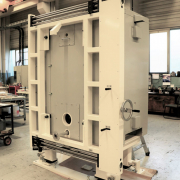European Innovation Fund: EU Invests in Clean Tech Projects
In July this year, the European Commission announced that the EU is investing over 1.8 billion Euro in 17 large-scale innovative clean-tech projects with a third round of awards under the Innovation Fund.
As reported, grants will be disbursed from the Innovation Fund to help bring breakthrough technologies to the market. The selected projects are located in Bulgaria, Finland, France, Germany, Iceland, the Netherlands, Norway, Poland and Sweden. “The Innovation Fund is an important tool to scale up innovations in renewable hydrogen and other solutions for European industry,” the EU Commission’s Executive Vice-President, Frans Timmermans, was cited. “Compared to the first disbursement round, the funds available have increased by 60 percent, enabling us to double the number of projects supported. This is a big boost for the decarburization of energy-intensive industry in the European Union.”
The 17 projects were selected under the second call for large-scale projects, meaning they have capital costs above 7.5 million Euro. According to the European Commission, the projects were evaluated by independent experts “based on their ability to reduce greenhouse gas emissions compared to traditional technologies and to innovate beyond the state-of-the-art, while being sufficiently mature for deployment”. Other selection criteria included the projects‘ potential for scalability and cost-effectiveness.
The selected projects cover a wide range of sectors contributing to the EU‘s decarburization efforts such as production, distribution and use of green hydrogen, waste-to-hydrogen, offshore wind, manufacturing of photovoltaic (PV) modules, battery storage and recycling, carbon capture and storage, sustainable aviation fuels, and advanced biofuels. Together, they have the potential to save 136 million tons of CO2eq over their first ten years of operation, the information said.
Projects in brief
Cement (4 projects): A project in Germany will deploy a second-generation oxyfuel carbon capture process at a cement plant and provide it as raw material for further processing into synthetic methanol. Another one in Poland will create an end-to-end carbon capture and storage chain starting from CO₂ capture and liquefaction at a cement plant to storage in offshore sites. A third project will capture the CO₂ emissions from exhaust gases produced during lime production and store them permanently in offshore geological formations in France. Finally, another project will be the first full-chain carbon capture and storage project in Bulgaria, linking CO₂ capture facilities at a cement plant with offshore permanent storage in a depleted gas field in the Black Sea, through an onshore and offshore pipeline system.
Chemicals (3 projects): In Finland, a project will chemically recycle plastics to be used as a feedstock for refineries. Another project in Sweden will create a first-of-a-kind methanol plant converting CO₂, residue streams, renewable hydrogen and biogas to methanol. Another project in Finland will produce a new fiber from pulp to substitute polyester in textile applications.
Hydrogen (3 projects): In the Netherlands, one project will produce, distribute and use green hydrogen through an electrolyzer supplied by offshore wind electricity. Another one will produce 15,500 tons of renewable hydrogen per year. The third one will process non-recyclable solid waste streams and transform them primarily into hydrogen.
Refineries (2 projects): In Norway, one project will build and operate the world‘s first commercial-scale drop-in biofuel production facility, converting forestry waste into advanced second-generation biofuels and bio char. A project in Sweden will build a large-scale facility for producing synthetic sustainable aviation fuel, using CO₂ captured at a Combined Heat and Power (CHP) plant.
Manufacturing of components for energy storage or renewables production (3 projects): In Poland, a project will create a manufacturing plant of innovative electrochemical battery systems to provide short-term electricity storage. Another project in the North of France will build a manufacturing plant for photovoltaics based on innovative heterojunction technology. A third project in France will construct a Li-Ion recycling plant at the Dunkirk battery cluster for producing and refining black mass, providing access to a secondary source of battery raw material.
Renewable energy: In the German part of the North Sea, a project will construct and operate an offshore windfarm, which will implement innovative solutions for turbines and hydrogen.
Carbon capture and storage infrastructure: A project in Iceland will build a highly scalable onshore carbon mineral storage terminal with an estimated overall storage capacity of 880 million tons of CO₂.
www.ec.europa.eu/clima/eu-action/funding-climate-action/innovation-fund_en
(Published in GLOBAL RECYCLING Magazine 3/2022, Page 3, Photo: Yves Bernardi / pixabay.com)








